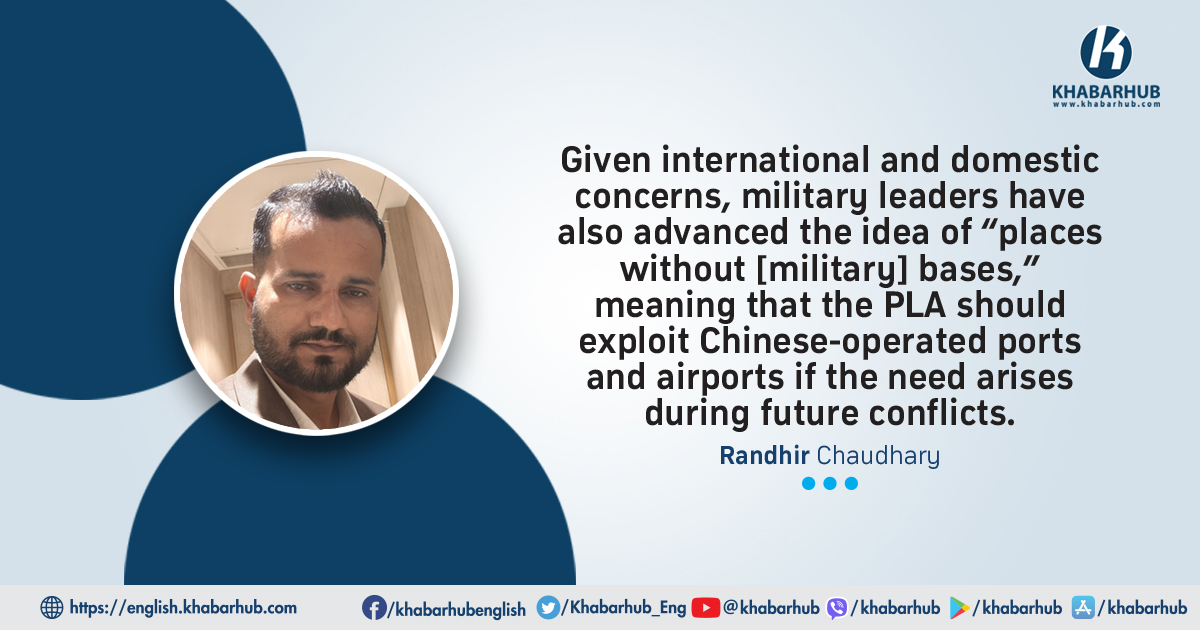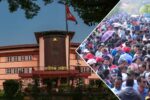An article by Yunsong, a professor at the School of International Studies and the Institute of South Asian Studies at Sichuan University, China, was published in Nepal’s national broadsheet.
The article is intended to be read in English even though it was published in Nepali. The title of the article is, ‘Will Nepal move forward, or will it get stuck in stagnation?’
For those interested in research and study, this article, written by a Chinese think tank regarding the situation in Nepal, is certainly worth a read. The crux of the article can be summed up in a sentence: “China wants Nepal to establish a National BRI Authority as a non-political body headed by engineers, economists, and experts without elections.”
However, after reading the advisory article thoroughly, some curiosity has been piqued.
After reading the article, I revisited How China Loses: The Pushback Against Chinese Global Ambitions, a book written by Luke Patey, a senior research fellow at Oxford University and a senior researcher at the Danish Institute for International Studies. The book records the experiences of African, East Asian, and South Asian nations that have implemented the Belt and Road Initiative (BRI).
The “debt trap” and the “Sri Lankan model” are highly undesirable to the Chinese. The professor recommends that Nepal should learn from the success of the Mombasa-Nairobi railway, which was constructed with BRI support.
Although Professor Yunsong did not mention China’s strategic objectives within the BRI, Luke Patey’s book cites Chinese Major General Wang Weixing, who acknowledged that the Belt and Road is part of the PLA’s “go global” strategy.
New showcase railway lines in the BRI have faced difficult early years in Kenya and Ethiopia, two of Africa’s biggest recipients of Chinese financing. A standard-gauge railway (SGR) spanning more than 470 kilometers was funded and constructed by China in Kenya to link the capital, Nairobi, with the port city of Mombasa.
The railway was completed in June 2017 with much fanfare. However, at 3.2 billion dollars, it was wildly overpriced and funded by a loan from the Export-Import Bank of China. It cost three times as much per kilometer as the industry average.
The Kenyan government made this decision even though renovating the old railway line would have cost around a fourth of what the new one did, making it the best option in terms of cost-benefit analysis.
Since then, Kenyan officials have been detained on suspicion of corruption in connection with the project’s sale of public land. Despite being hailed as a passenger line, the SGR has not yet succeeded in its primary objective of shipping Kenyan-made items for export.
The railway project has clearly benefited China’s construction and railway industries. Prior to the building of the railway, Kenya already had a significant trade deficit with China, and from January 2018 to April 2019, 90 percent of the cargo transported inland by the railway was Chinese goods.
For a long time, trains left Mombasa with Chinese goods onboard but returned from Nairobi virtually empty. Even importers were forced by the Kenyan government to use the losing railway connection rather than truck goods from Mombasa to Nairobi.
Although freight earnings improved in 2019, revenues were still far below the Chinese loan repayment costs and operating costs of the railway.
Given this context, the professor’s advice that the Mombasa-Nairobi Railway reduced transportation expenses by 40 percent raises a question for Nepal: “Will the railway or connectivity chain be built without placing an extra economic burden on Nepal?” The curiosity stems from the deteriorating state of unproductivity in Nepal.
When critically examining the narratives spread by Chinese media claiming that there is no corruption in China, the story of the countries implementing the BRI is quite different.
As author and researcher Luke Patey cited, Xi Jinping declared that corruption would not be tolerated in the initiative during the 2019 Belt and Road Forum. Party leaders, businessmen, and lower-level officials were detained as part of Xi’s extensive anti-corruption drive, which started in 2013. However, Xi’s determination to eradicate corruption is constrained by the fact that it also targets his political rivals.
Further in the article, Yunsong has called the inability of Chinese companies to participate in the assistance provided by the US through the MCC to Nepal a colonial style.
The MCC, which has been passed by Nepal’s sovereign parliament, and the fact that Chinese companies are not participating in it, is being labeled a “colonial style” by Yunsong?
A few years ago, Malaysian Prime Minister Mahathir Mohamad shared his experience, saying that Chinese finance is used as a tool for imposing control over other nations.
During a press conference with Chinese Premier Li Keqiang in Beijing, he expressed alarm about a “new form of colonialism.”
Similarly, among the contractors involved in China-funded transport infrastructure projects in thirty-four Asian and European countries between 2006 and 2018, a staggering 89 percent were Chinese.
Only 8 percent of Chinese-funded projects went to local contractors, compared to 41 percent in loans from the World Bank and other multinational financial institutions.
The article, written with the aim of urging Nepal to start projects under the BRI, admires a few communist leaders like Madhav Kumar Nepal, Jhalanath Khanal, KP Sharma Oli, and Bidya Devi Bhandari for their cordial relations with the Chinese establishment and their milestone agreements between Nepal and China.
First, the construction of Pokhara International Airport, where a parliamentary committee investigation found that the Chinese construction company, China CAMC Engineering, and the Civil Aviation Authority of Nepal colluded to commit corruption involving billions of rupees during the contract process. Second, China forced Nepal Airlines Corporation to purchase Chinese aircraft, leading to a fiasco.
What strikes me as strange is that just a few months ago, the signing of the BRI Framework Implementation Agreement between the two countries was made possible after the immense efforts of Foreign Minister Arzu Rana Deuba, who de facto leads the Nepali Congress in the Oli Cabinet, and Nepali Congress General Secretary and MP Gagan Thapa. In light of this, the professor’s reluctance to acknowledge the valiant efforts of Deuba and Thapa, if not the entire NC, is apparent!
Although Professor Yunsong did not mention China’s strategic objectives within the BRI, Luke Patey’s book cites Chinese Major General Wang Weixing, who acknowledged that the Belt and Road is part of the PLA’s “go global” strategy.
For Wang, Chinese finance to countries searching for development opportunities can act as an effective lever for improving relations and securing access to new bases.
Given international and domestic concerns, military leaders have also advanced the idea of “places without [military] bases,” meaning that the PLA should exploit Chinese-operated ports and airports if the need arises during future conflicts.
I think Professor Yunsong has missed mentioning two experiences Nepal has accumulated dealing with China.
First, the construction of Pokhara International Airport, where a parliamentary committee investigation found that the Chinese construction company, China CAMC Engineering, and the Civil Aviation Authority of Nepal colluded to commit corruption involving billions of rupees during the contract process. Second, China forced Nepal Airlines Corporation to purchase Chinese aircraft, leading to a fiasco.
Finally, Professor, Nepal genuinely wishes to advance. However, are we to assume that Nepal won’t face further stagnation as a result of the Chinese BRI?








Comment